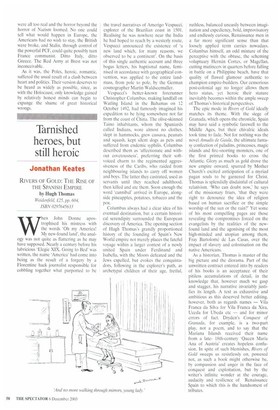Tarnished heroes, but still heroic
Jonathan Keates
RIVERS OF GOLD: THE RISE OF THE SPANISH EMPIRE by Hugh Thomas Weidenfeld, £25, pp. 604, ISBN 0297645633 When John Donne apostrophised his mistress with the words 'Oh my America! My new-found land', the analogy was not quite as flattering as he may have supposed. Nearly a century before his lubricious Elegie XIX. Going to Bed' was written, the name 'America' had come into being as the result of a forgery by a Florentine hack journalist responsible for cobbling together what purported to be the travel narratives of Amerigo Vespucci, explorer of the Brazilian coast in 1501. Realising he was nowhere near the India he had hoped to reach by a westerly route, Vespucci announced the existence of 'a new land which, for many reasons. we observed to be a continent'. On the basis of this single authentic account and three bogus letters, his baptismal name, feminised in accordance with geographical convention, was applied to the entire landmass, from pole to pole, by the German cosmographer Martin Waldseemuller.
Vespucci's better-known forerunner Christopher Columbus, making landfall on Watling Island in the Bahamas on 12 October 1492, had famously imagined his expedition to be lying somewhere not far from the coast of China. The olive-skinned Taino inhabitants, whom the Spaniards called Indians, wore almost no clothes. slept in hammocks, grew cassava, peanuts and squash, kept silent dogs as pets and suffered from endemic syphilis. Columbus described them as 'affectionate and without covetousness', preferring their softvoiced charm to the regimented aggressiveness of the Caribs, who raided from neighbouring islands to carry off women and boys. The latter they castrated, used as servants until they reached adulthood, then killed and ate them. Soon enough the word 'cannibal' arrived in Europe, alongside pineapples, potatoes, tobacco and the pox.
Columbus always had a clear idea of his eventual destination, but a certain historical serendipity surrounded the European discovery of America. The opening section of Hugh Thomas's grandly proportioned history of the founding of Spain's New World empire not merely places the fateful voyage within a larger context of a newly united Spain under Ferdinand and Isabella, with the Moors defeated and the Jews expelled, but evokes the conquistadors, following in the explorer's path, as archetypal children of their age. fretful, ruthless, balanced uneasily between imagination and expediency, bold, improvisatory and endlessly curious, Renaissance men in a far more significant sense than that loosely applied term carries nowadays. Columbus himself, an odd mixture of the perceptive with the obtuse, the scheming voluptuary Hernan Cortes, or Magellan, cutting mutineers in quarters before falling in battle on a Philippine beach, have that quality of flawed glamour authentic to champion empire-builders. Our censorious post-colonial age no longer allows them hero status, yet heroic their stature inevitably becomes within the ample sweep of Thomas's historical perspectives.
The epic mode in Rivers of Gold ideally matches its theme. With the siege of Granada, which opens the chronicle. Spain may have said a symbolic farewell to the Middle Ages, but their chivalric ideals took time to fade. Not for nothing was the novel Amadis de Gaula, the ultimate fantasy confection of paladins, princesses, magic islands and fire-snorting monsters, one of the first printed books to cross the Atlantic. Glory as much as gold drove the new empire onward, spurred by Mother Church's excited anticipation of a myriad pagan souls to be garnered for Christ. Thomas is splendidly disdainful of cultural relativism. 'Who can doubt now,' he says of the missionary friars, 'that they were right to denounce the idea of religion based on human sacrifice or the simple worship of the sun or the rain?' Yet some of his most compelling pages are those revealing the compromises forced on the evangelists by the realities of the newfound land and the agonising of the most high-minded and utopian among them, Fray Bartolome de Las Casas, over the impact of slavery and colonisation on the native Americans.
As a historian, Thomas is master of the big picture and the diorama. Part of the unwritten contract entered into by readers of his books is an acceptance of their pitiless accumulations of detail, in the knowledge that, however much we gasp and stagger, his narrative invariably justifies its length. A text as exhaustive and ambitious as this deserved better editing, however, both as regards names — Vila Franca da Silva for Vila Franca da Xira. Uceda for Ubeda etc — and for minor errors of fact. Dryden's Conquest of Granada, for example, is a two-part play, not a poem, and to say that the Mariana Islands received their name from a late18th-century 'Queen Maria Ana of Austria' creates hopeless confusion. In spite of such blemishes, Rivers of Gold sweeps us resistlessly on, powered not, as such a book might otherwise be, by compassion and anger in the face of conquest and exploitation, but by the writer's infinite wonder at the courage, audacity and resilience of Renaissance Spain to which this is the handsomest of tributes.


























































































 Previous page
Previous page